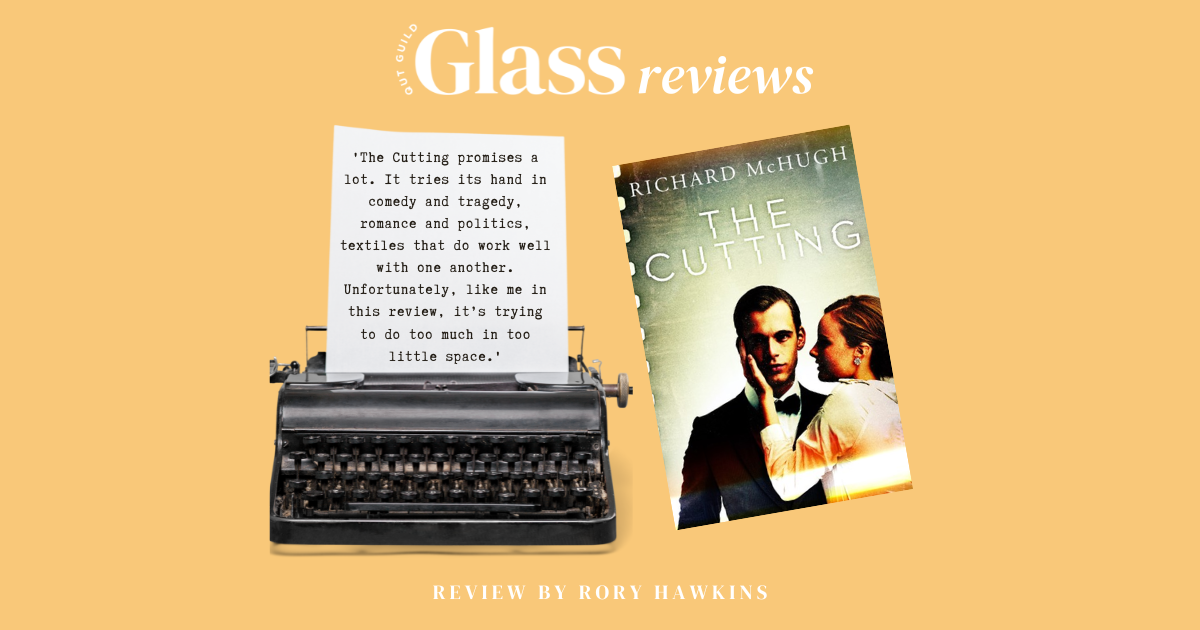by Rory Hawkins
Because I almost completely lack the patience to practice drawing and painting, I once tried scrapbooking. You start by tearing up random materials in a semi-random way, curating it to look sort of deliberate, and then tell everyone (yourself included) that it was all very deliberate. I don’t know what the collage consensus on tearing versus cutting is – like I said, ‘tried’ – but I know they achieve distinct aesthetics.
Tearing is natural, emotional, rough, usually messy. Cutting is precise, clear, uniform, usually plain. Trust me, I’m not stretching this metaphor for wordplay’s sake; this is how I feel after finishing Richard McHugh’s second novel, The Cutting; like I’m in an art gallery and I’ve stepped back to take in a collage piece, see how it comes together. There’s a lot.
Eject your mind back to 2016: Illy’s Papercuts on the radio, Turnbull lounging in the PM’s chair, Clive Palmer’s QLD nickel mine going defunct. Well, in Richard Hugh’s world he’s not the only one; fictional trust fund-scion Lance Alcocke’s iron mine, nicknamed Madeleine’s Monster, just opened for business – and immediately folded.
Caught in this mass unemployment mess is young engineer Will Fulbright – smart, fickle, and a *definitely* casual porn/meth user. Also on the rocks: his relationship with university-beau and professional activist Justine Jamieson. Director of the advocacy group Free All Refugee Children! she’s in need of a wealthy donor to bankroll her human rights ambitions. Re-enter, Lance Alcocke and his potential billions.
Following these three protagonists, The Cutting tries to balance romance, coming-of-age, and political intrigue conventions. Will, Justine, and Lance make an eclectic love triangle: Will loves Justine (or the sex they used to have); Justine loves to *feel* like she’s making a difference; and Lance loves… being loved? He has mummy issues.
But wait, did I say it all happens in 2016? A white lie. While The Cutting’s plot tears between these three protagonists, it also cuts across time, whole chapters sending you back to the genesis of Will and Justine’s relationship and Lance’s entire home/uni life. We get an idea of how what environments made these characters and how they’ve embraced or distanced themselves from these origins. Ultimately though, I found this an exercise in predictability, a shadow of tragic events to come later in the novel.
Because of this non-linear design, pacing varies between what’s happening for who and when, and it doesn’t feel like a hell of a lot really happens in the characters’ present day. To begin with, McHugh’s longer descriptive prose is extremely tongue-in-cheek, patronising his protagonists’ behaviour. But as tension mounts and syntax remains the same, it simply reads as sardonic, rather than relishing in the drama. In contrast, The Cutting’s dialogue is always sharp and witty, layered with subtext. McHugh’s characters are at their best when you get to see them interacting, rather than frequent descriptive prose paraphrasing their lives.
This pacing comes to an eventual head in The Cutting’s final two chapters, clarified after the fact in the epilogue. While this avoids tried and tired cliches in resolving this conflict, it jump-cuts over any moment of ultimate tension for the characters, handing us off to them in tentative bliss. Not an unsatisfactory ending; but how we got there, less so.
Mid-way through the novel three protagonists become four. Lee-Anne, Will’s elderly mum, is a necessary perspective to have for plot reasons, but feels at odds with the lens of the main trio. If The Cutting is about characters inheriting the problems of their family and culture, and attempting to chart a more idealistic future, Lee-Anne isn’t entirely in the same position, and feels tacked on.
The Cutting promises a lot. It tries its hand in comedy and tragedy, romance and politics, textiles that do work well with one another. Unfortunately, like me in this review, it’s trying to do too much in too little space. This collage has all the right materials. They’re arranged very deliberately. I get it; 2016 (Papercuts aside) was not a good year for Australia. But I don’t believe The Cutting presents McHugh’s commentary as well as it could.
The Cutting is available now from Penguin.
Rory Hawkins is a second year creative writing student who swears he enjoys more writing fiction, but good ideas keep getting bigger than the word count. Find more of his work in Glass, prose and poetry online with ScratchThat Magazine, read aloud with QUT Lit Salon, and through his Instagram @rory_writes_sometimes.






